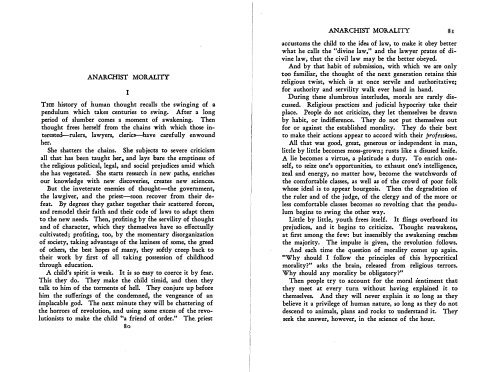Kropotkin's Revolutionary Pamphlets - Libcom
Kropotkin's Revolutionary Pamphlets - Libcom
Kropotkin's Revolutionary Pamphlets - Libcom
Create successful ePaper yourself
Turn your PDF publications into a flip-book with our unique Google optimized e-Paper software.
ANARCHIST MORALITY<br />
ANARCHIST MORALITY<br />
I<br />
THE history of human thought recalls the swinging Qf a<br />
pe <br />
dulum which takes centuries tOo swing. After a long<br />
perIod Qf slumber comes. a mQment Qf awakening. Then<br />
thought frees herself frQm the chains with which those interested-rulers,<br />
lawyers, clerics--have carefully enwound<br />
her.<br />
She shatters the chains. She subjects to severe criticism<br />
all that has been taught her" and lays bare the emptiness Qf<br />
the religious political, legal, and social prejudices amid which<br />
she has vegetated. She starts research in new paths, enriches<br />
Qur knowledge with new discoveries, creates new sciences.<br />
But the inveterate enemies Qf thought-the government,<br />
the lawgiver, and the priest-soon recover from their defeat.<br />
By degrees they gather tQgether their scattered forces,<br />
and remodel their faith and their code of laws tOo adapt them<br />
tOo the new needs. Then, prQfiting by the servility Qf thought<br />
and of character which they themselves have so effectually<br />
. :<br />
cultivated; prQfitmg, too, by the mQmentary disQrganization<br />
of society, taking advantage of the laziness of some, the greed<br />
of others, the best hopes Qf many, they SQftly creep back tOo<br />
their work by fust of all taking possession Qf childhood<br />
through education.<br />
.t: child's spirit is weak. It is so easy tOo coerce it by fear.<br />
This the f do. They make the child timid. and then they<br />
talk tOo him Qf the torments Qf hell. They cQnjure up befQre<br />
?im the sufferings of the cQndemned, the vengeance of an<br />
Implacable god. The next minute they will be chattering of<br />
the horrors of revolution, and using some excess of the revolutionists<br />
to make the child "a friend of order." The, priest<br />
800<br />
accustOoms the child tOo the idea of law, to make it Oobey better<br />
what he calls the «divine law," and the lawyer prates of divine<br />
law, that the civil law may be the better obeyed.<br />
And by that habit of submission, with which we arc only<br />
too familiar, the thought of the next generation retains this<br />
religious twist, which is at once servile and authoritative;<br />
for authority and servility walk ever hand in hand.<br />
During these slumbrous interludes, morals are rarely discussed.<br />
Religious practices and judicial hypocrisy take their<br />
place. People do not criticize, they let themselves be drawn<br />
by habit, or indifference. They do not put themselves out<br />
for or against the established morality. They do their best<br />
to make their actions appear to accord with their professions.<br />
All that was good, great, generous or independent in man,<br />
little by little becomes moss-grown ; rusts like a disused knife.<br />
A lie becomes a virtue, a platitude a duty. To enrich oneself,<br />
to seize Qne's opportunities, to exhaust Qne's intelligence,<br />
zeal and energy, no matter how, become the watchwords of<br />
the comfortable classes, as well as of the crQwd Qf poor folk<br />
whose ideal is to appear bourgeois. Then the degradation of<br />
the ruler and of the judge, of the clergy and Qf the more or<br />
less comfortable classes becomes so revolting that the pendulum<br />
begins to swing the other way.<br />
Little by little, youth frees itself. It flings overboard its<br />
prejudices, and it begins to criticize. Thought reawakens,<br />
at first among the few: but insensibly the awakening reaches<br />
the majority. The impulse is given, the revolution follows.<br />
And each time the question of morality comes up again.<br />
"Why should I follow the principles of this hypocritical<br />
morality?" asks the brain, released from religious terrors •<br />
Why should any morality be Oobligatory?"<br />
Then people try to account for the moral sentiment that<br />
they meet at every turn without having explained it tOo<br />
themselves. And they will never explain it so long as they<br />
believe it a privilege of human nature, 500 long as they do not<br />
descend to animals, plans and rocks to understand it. They<br />
seek the answer, however, in the science of the hour.

















